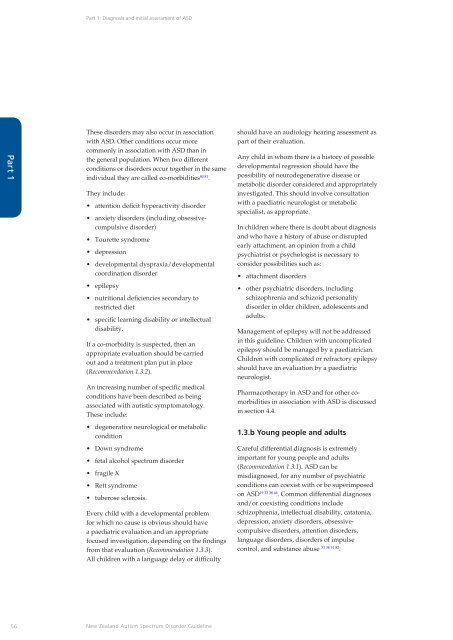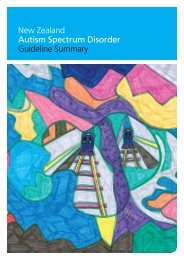New Zealand Autism Spectrum Disorder Guideline - Ministry of Health
New Zealand Autism Spectrum Disorder Guideline - Ministry of Health
New Zealand Autism Spectrum Disorder Guideline - Ministry of Health
Create successful ePaper yourself
Turn your PDF publications into a flip-book with our unique Google optimized e-Paper software.
Part 1: Diagnosis and initial assessment <strong>of</strong> ASD<br />
Part 1<br />
These disorders may also occur in association<br />
with ASD. Other conditions occur more<br />
commonly in association with ASD than in<br />
the general population. When two different<br />
conditions or disorders occur together in the same<br />
individual they are called co-morbidities 80 81 .<br />
They include:<br />
• attention deficit hyperactivity disorder<br />
• anxiety disorders (including obsessivecompulsive<br />
disorder)<br />
• Tourette syndrome<br />
• depression<br />
• developmental dyspraxia/developmental<br />
coordination disorder<br />
• epilepsy<br />
• nutritional deficiencies secondary to<br />
restricted diet<br />
• specific learning disability or intellectual<br />
disability.<br />
If a co-morbidity is suspected, then an<br />
appropriate evaluation should be carried<br />
out and a treatment plan put in place<br />
(Recommendation 1.3.2).<br />
An increasing number <strong>of</strong> specific medical<br />
conditions have been described as being<br />
associated with autistic symptomatology.<br />
These include:<br />
• degenerative neurological or metabolic<br />
condition<br />
• Down syndrome<br />
• fetal alcohol spectrum disorder<br />
• fragile X<br />
• Rett syndrome<br />
• tuberose sclerosis.<br />
Every child with a developmental problem<br />
for which no cause is obvious should have<br />
a paediatric evaluation and an appropriate<br />
focused investigation, depending on the findings<br />
from that evaluation (Recommendation 1.3.3).<br />
All children with a language delay or difficulty<br />
should have an audiology hearing assessment as<br />
part <strong>of</strong> their evaluation.<br />
Any child in whom there is a history <strong>of</strong> possible<br />
developmental regression should have the<br />
possibility <strong>of</strong> neurodegenerative disease or<br />
metabolic disorder considered and appropriately<br />
investigated. This should involve consultation<br />
with a paediatric neurologist or metabolic<br />
specialist, as appropriate.<br />
In children where there is doubt about diagnosis<br />
and who have a history <strong>of</strong> abuse or disrupted<br />
early attachment, an opinion from a child<br />
psychiatrist or psychologist is necessary to<br />
consider possibilities such as:<br />
• attachment disorders<br />
• other psychiatric disorders, including<br />
schizophrenia and schizoid personality<br />
disorder in older children, adolescents and<br />
adults.<br />
Management <strong>of</strong> epilepsy will not be addressed<br />
in this guideline. Children with uncomplicated<br />
epilepsy should be managed by a paediatrician.<br />
Children with complicated or refractory epilepsy<br />
should have an evaluation by a paediatric<br />
neurologist.<br />
Pharmacotherapy in ASD and for other comorbidities<br />
in association with ASD is discussed<br />
in section 4.4.<br />
1.3.b Young people and adults<br />
Careful differential diagnosis is extremely<br />
important for young people and adults<br />
(Recommendation 1.3.1). ASD can be<br />
misdiagnosed, for any number <strong>of</strong> psychiatric<br />
conditions can coexist with or be superimposed<br />
on ASD 19 33 38 46 . Common differential diagnoses<br />
and/or coexisting conditions include<br />
schizophrenia, intellectual disability, catatonia,<br />
depression, anxiety disorders, obsessivecompulsive<br />
disorders, attention disorders,<br />
language disorders, disorders <strong>of</strong> impulse<br />
control, and substance abuse 33 34 51 82 .<br />
56<br />
<strong>New</strong> <strong>Zealand</strong> <strong>Autism</strong> <strong>Spectrum</strong> <strong>Disorder</strong> <strong>Guideline</strong>











